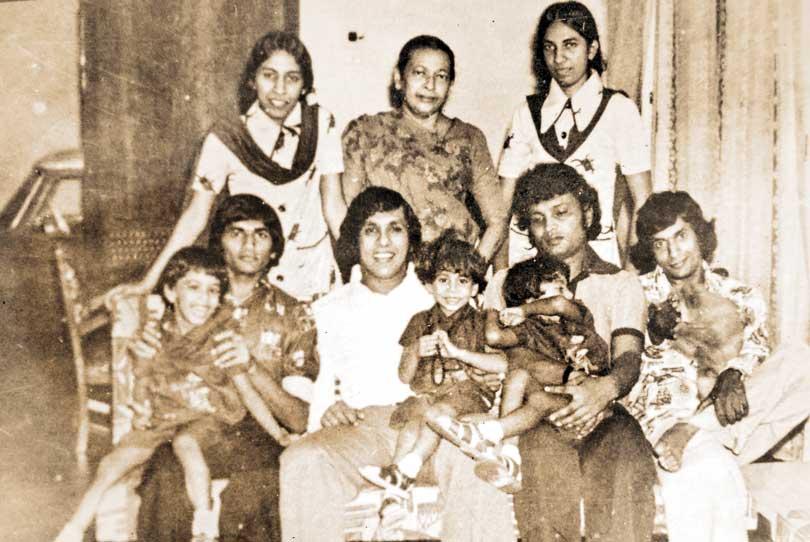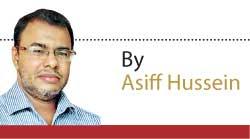Reply To:
Name - Reply Comment
Last Updated : 2024-04-25 17:00:00

 The moon-long fast in the Islamic month of Ramadan when Muslims have to abstain from food, drink and sex is no easy task for the worldly minded, but once one’s mind and body is attuned to it from one’s young days, it doesn’t prove to be so difficult after all. It increases piety, inculcates patience, instills discipline, stimulates empathy with the poor and leads to good health – not a bad prospect after all.
The moon-long fast in the Islamic month of Ramadan when Muslims have to abstain from food, drink and sex is no easy task for the worldly minded, but once one’s mind and body is attuned to it from one’s young days, it doesn’t prove to be so difficult after all. It increases piety, inculcates patience, instills discipline, stimulates empathy with the poor and leads to good health – not a bad prospect after all.
Like most Muslim children we were taught to fast from our very young days, at about the age of seven or so. Our parents would wake us up in the wee hours before dawn broke to partake of a meal known as sahar. I still wonder how they managed to get us up at that time; perhaps an alarm clock did the trick. In the olden days though, before we were born, there were fakeer mendicants with hurricane lanterns who would do the rounds in local towns, knocking on the doors and shouting a mumbo jumbo “Otto Bawa Otto” to wake up the faithful for the last meal before the fast, a tradition still found in certain parts of the Arab world where a wake-up call man known as Misarahati appearing as if mysteriously in the dead of night and shortly before the break of dawn, and holding a lamp,would sing and beat his little drum to wake up people, sometimes even calling out their names; a Wee Willie Winkie of sorts, only with the roles reversed, for he woke up people, not ensured that they were asleep.
We would not have anything to eat or drink till dusk set in, when we would break our fast, usually with dates and water in the tradition of our beloved Prophet, though after this we freely indulged in some well deserved delicacies like samosas, triangular pastries filled with minced beef and gulab jamoons, ball-shaped cakes soaked in sweet syrup, washed down with faluda, a refreshing drink made with milk and rose syrup. This last was almost out of the world; nectar, elixir, ambrosia, all in one, so
relieving to a parched tongue.
My favourite were the gulab jamoons, an item of Indian origin we got from Bombay Sweet House in Colpetty. So much so that once when our Islam teacher at Mahanama College Sitty Miss inquired what we had for our pre-dawn meal I blurted out ‘gulab jamoons’ without giving it much thought. Quite taken aback she advised me that we ought to take something more substantial. “You must take rice!” she told me matter of factly. I wouldn’t ever forget that piece of sagely counsel, or that shocked look on her face, perhaps imagining us spoilt brats greedily stuffing our little bellies with these gulab jamoons, slurping and burping till we could take no more.
Some of our fasts we broke at home and some we broke at father’s family home, a stately house down Alwis Place in Colpetty which was named Darlington, but which we called Umma House after our grandmother. In the Arabicized Tamil spoken by local Muslims, one’s paternal grandmother is known as Vappa-umma (Father’s Mother), but we simply called her Umma or ‘Mother’ because our aunts did so, a sure way of bridging the much talked about generation gap.
The rice, usually the long-grained basmathi, was cooked in a very large aluminium vessel in the kitchen along with ghee or clarified butter, perfumed with rose water and coloured yellow
The folk here had it as good as us or even better, given grandma’s culinary skills, including preparing that invigorating gruel known as kanji she used to make with rice, coconut milk and garlic with a generous quantity of beef bones and flesh thrown in for good measure. This regimen would go on for a month, or rather a moon of 29 or 30 days before it would all end with the Ramadan festival the very next day.
On that day we would resort to Umma House clad in our finery, new clothes mother had sewn for us, and instinctively cluster round a large table that groaned with goodies of all descriptions. Liberally spread out on the table that day were a variety of sweetmeats grandma had herself prepared, so numerous that I am not even able to recall what they were except that they included sanja, a firm jelly made of seaweed cut into square or diamond shapes and coloured red or green, sooji, a soft yellow confection made of semolina, margarine and sugar and ambarella dosi, a juicy brownish fruit preserve made by boiling hogplum in sugar syrup.
The luncheon that followed in the afternoon that day comprised of an exceedingly rich and delectable rice dish known as buriyani of grandma’s own making, ably assisted by her faithful accomplice, an elderly Muslim woman from Slave Island we called Nona Sacchi. What went into it was of course no secret. The rice, usually the long-grained basmathi, was cooked in a very large aluminium vessel in the kitchen along with ghee or clarified butter, perfumed with rose water and coloured yellow, varying from grain to grain, from a deep yellow, almost orange to a lighter yellow. It was spiced with various condiments and embellished with chunks of beef or mutton. The meal was served on a platter upon a large rectangular table in the inner hall with its usual accompaniments of chicken curry, mixed pea, cashewnut and liver curry, mint sambol and slices of pineapple.
In keeping with local Muslim custom, the males who ate first. The master of the house, uncle Nazir, would be seated with his kith and kin, sidekicks and stooges around the long table as if in a sumptuous banquet the likes of which we saw only in our Asterix comics when the Gauls feasted after the return of their hero, only that it was without the wild boar. We kids were given a place in the table at the very first serving as uncle Nazir loved having us around. The womenfolk would have their meals after the men had partaken of theirs. It was the law of the lion here.
The aromatic rice and meat meal we would indulge in to our fill, and as if that were not enough, would be served at the end of it, a cup of vattalappam, a soft brown pudding studded with little pores that oozed with sweet syrup which grandmother had prepared earlier in the day by steaming in ceramic or aluminium bowls a mixture of coconut milk, beaten eggs, palm sugar and cardamoms. Later in the day, before we took leave to return home, some of our elders, grandma and uncle Nazir particularly, would force into our hands notes of money which they called perunaal salli (festival money) to do with it as we wished.
The fact however is that living in a largely non-Muslim tropical isle, we kids missed out on much of the revelry and merriment that characterizes the Ramadan festival and even the moon-long evenings and nights after breaking the fast seen in Islamic countries, particularly in the Arab world where it is considered the most joyful of months with happy families picnicking in green areas like parks and zoos when breaking their fast, a custom that has only recently emerged in our country when whole families would resort to scenic spots like the Galle Face Green and more recently the lawn in front of the Town Hall to break their fast picnic style, but one which we never saw in our young days.
As part of the festivities in these countries which unlike ours has evolved over time, getting merrier and merrier as people partook of the cheer of the good season, one finds the streets and shops gaily decorated with brightly lit lights often in the form of crescent and star, lucent lanterns of white and myriad colours and even golden and silver tinsel decorations, again of star and crescent which is widely considered the symbol of Islam ever since the days of the Ottoman Turks.
And when it all crescendos in the day of the festival, little children would be gifted with beautifully decorated gift bags of toys and candy or money to spend time at amusement parks, while towards the evening and night, people in festive mood would gather to enjoy communal meals with cookies for the little ones filled with nuts and coated with sugar, musical plays and even fireworks, all of which dwarf the Christmas celebrations of the West. But all this we in our little country missed.
The Prophet of Islam, despite his abstemious lifestyle, was no killjoy and always had the happiness of people and especially of children in mind, so much so that one day when an over-zealous companion found some little girls singing in the Prophet’s house and cried out: “Musical instruments of Satan in the house of the Messenger of God!”, the Prophet rebuked him “Leave them alone, Abu Bakr, every nation has a festival, and this is our festival”. This was somebody from whom even Oliver Cromwell and his roundheads - who in their puritanical fervour banned Christmas celebrations in England - could have learnt from, at least for the sake of the children.

Add comment
Comments will be edited (grammar, spelling and slang) and authorized at the discretion of Daily Mirror online. The website also has the right not to publish selected comments.
Reply To:
Name - Reply Comment
US authorities are currently reviewing the manifest of every cargo aboard MV
On March 26, a couple arriving from Thailand was arrested with 88 live animal
According to villagers from Naula-Moragolla out of 105 families 80 can afford
Is the situation in Sri Lanka so grim that locals harbour hope that they coul